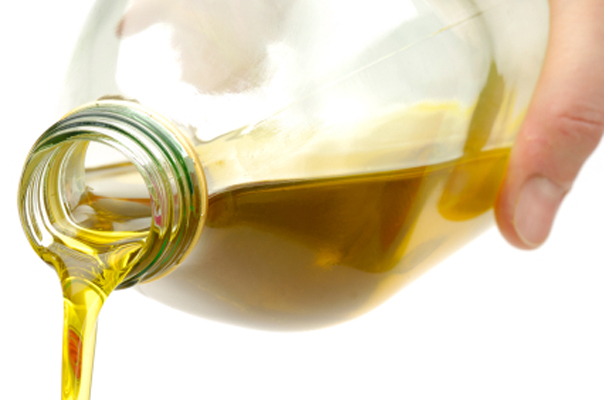All cooking oils contain varying amount of saturated, monounsaturated and polyunsaturated fatty acids. People are becoming more and more health conscious and when it comes to cooking, healthy ingredients are recommended. Oils and fats that have high proportions of saturated fats are not as healthy as those with high unsaturated fats. Monounsaturated fats and polyunsaturated fats are often described as “healthy fats”. Polyunsaturated fats helps lower cholesterol. Omega-3 polyunsaturates for instance helps protect one from getting heart disease and omega-6 on the other hand help in growth and brain function. Most cooking oils come from plants specifically nuts and seeds and this article will tackle the different types of cooking oil and their benefits to enable you to know what to look for in the many types of oils so that you can stay healthy.
Olive Oil
Olive oil is rich in monounsaturated fats and is considered healthier than other types of cooking oil. It contains about 75% of its fat in the form of oleic acid (a monounsaturated, omega-9 fatty acid). Olive oil has vitamin E and other important compounds that help against certain diseases and also lowers cholesterol level. Polyphenols in olive oil acts as antioxidants and as anti-inflammatory nutrients in the body, thereby improving the digestive and bone health. Several studies have also uncovered other fascinating ways in which olive oil provides its anti-cancer benefits. The different types of olive oil are: refined, virgin, extra virgin and extra light. Extra virgin is the commonly used variety, although all the varieties have many uses such as: cooking, sauteing, stir frying and also as an ingredient in different recipes. However, its quality depends on the olive variety used, the climate, region and the cultivation and harvesting methods. Olive oil is generally not recommended for cooking since its high monounsaturated fat content makes it susceptible to oxidation at high temperatures.
Coconut Oil
Coconut oil is one of the most well-known natural oil for it’s many health benefits. Obtained from the famous tropical fruits, it contains a high percentage of saturated fat (up to 60%) which is higher than butter (35%) and beef fat (25%). Saturated fat particularly from animal products, can increase our bad cholesterol. While too much saturated fat is bad for our heart, as it increases “bad” LDL cholesterol level, a cause of many heart diseases. Coconut oil is different, as most of the saturated fats in coconut oil comes from lauric acid. Lauric acid increases “good” HDL cholesterol levels in the blood. Coconut oil does not oxidize easily at high temperatures making it a good choice for cooking and baking.
Canola Oil
In terms of monounsaturated fat, the closest common culinary oil next to olive oil is canola oil with about 60% of its fat coming in monounsaturated form. Canola oil is low in saturated fat and also contains a significant level of polyunsaturated omega-3 and omega-6 fat. In addition, canola oil contains significant amounts of phytosterols that reduce the absorption of cholesterol into the body. Avoid overheating of oil to avoid damaging the healthy-promoting fatty acids that oil contain. Approximately 90% of the canola in the United States is GMO, so if you choose to use canola oil make sure you buy a non GMO Project Verified product. If you can’t find a verified alternative, look for a certified organic option.
Sunflower oil
Sunflower seed oil is commonly used in frying, fast-food prep and packaged and processed foods. Sunflower oil is high in vitamin E and low in saturated fat and it is extracted by gently pressing the sunflower seeds. It has a high burn temperature, is inexpensive and versatile and it is widely used especially in potato crisps production. Although the fatty acids in sunflower oil are important and essential in our diet, sunflower oil does have a higher omega-6 content than most other vegetable oils. The optimum ratio of omega-6 to omega-3 fatty acids recommended for good health is 1 to 1. If sunflower oil is used in excess, without intentionally boosting your omega-3 intake, then it can result in an imbalance of fatty acids in the body, which is dangerous.
Corn Oil
Corn oil is used for both baking and frying although on medium temperatures only. Over half of the fat in corn oil is polyunsaturated fat. Polyunsaturated fatty acids are equally as important as monounsaturated fats for stabilizing cholesterol and safeguarding your heart. Corn comes under top GMO crops. Approximately 88% of corn is GMO in United States, so if you choose to use corn oil make sure you buy a non GMO Project Verified product. If you can’t find a verified alternative, look for a certified organic option. Corn does contain large amounts of fatty acid and is rich in calories, so for people who are already at high risk for heart disease, excess corn or corn oil can dangerously exacerbate those conditions and risks.
In conclusion, cooking oils vary in price due to the different ingredients used and one should be careful when buying the best oil because those that are low in price are definitely cheap for a reason. For the consumer, always look for oils with labels that state that they are organic and they are not subjected to high temperatures during refining. Of all the oils listed above, using natural unrefined oils that contain more antioxidants overall, such as olive oil and coconut oil, gives your body the nutrients it needs to protect you from disease. Extra virgin olive oil in particular, is not refined and therefore retains all the natural ingredients it contains. Therefore choose your oil wisely and stay healthy.
★★ Get our FREE Mobile app, Recommended by 90+ Doctors. Stay Healthy! ★★

what about rice bran oil? Is it good for health or not?
Pls add some info about how cooking oils are extracted/processed. I hear the processing impacts our health as well. Thanks. And oh, I’ve just downloaded this app and I’m starting to love it!